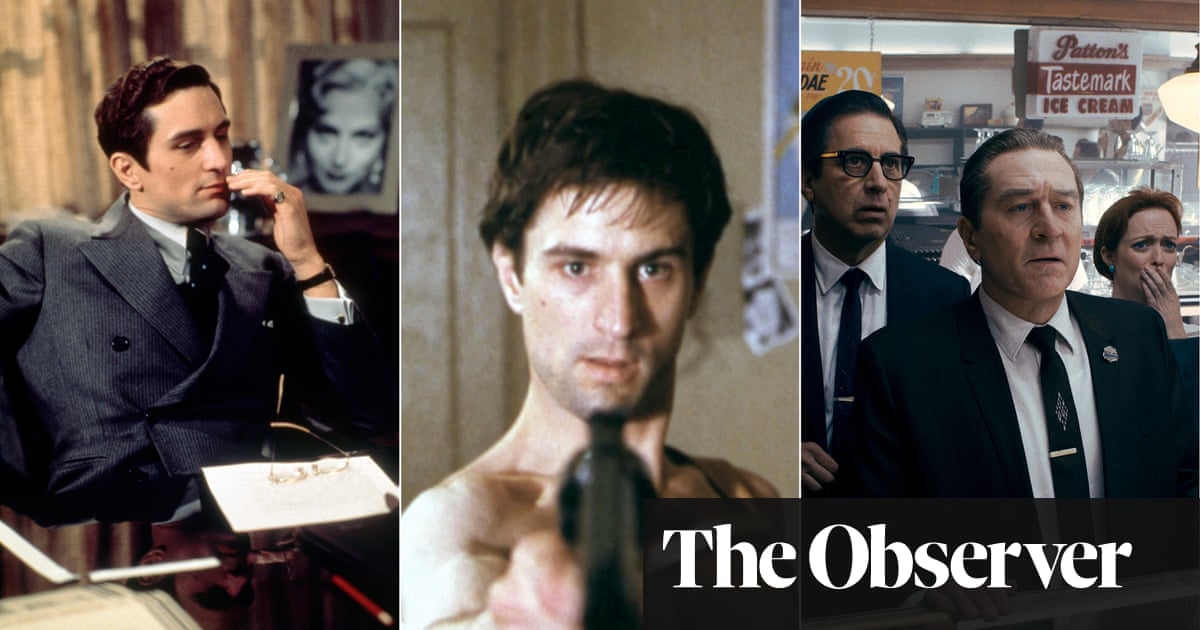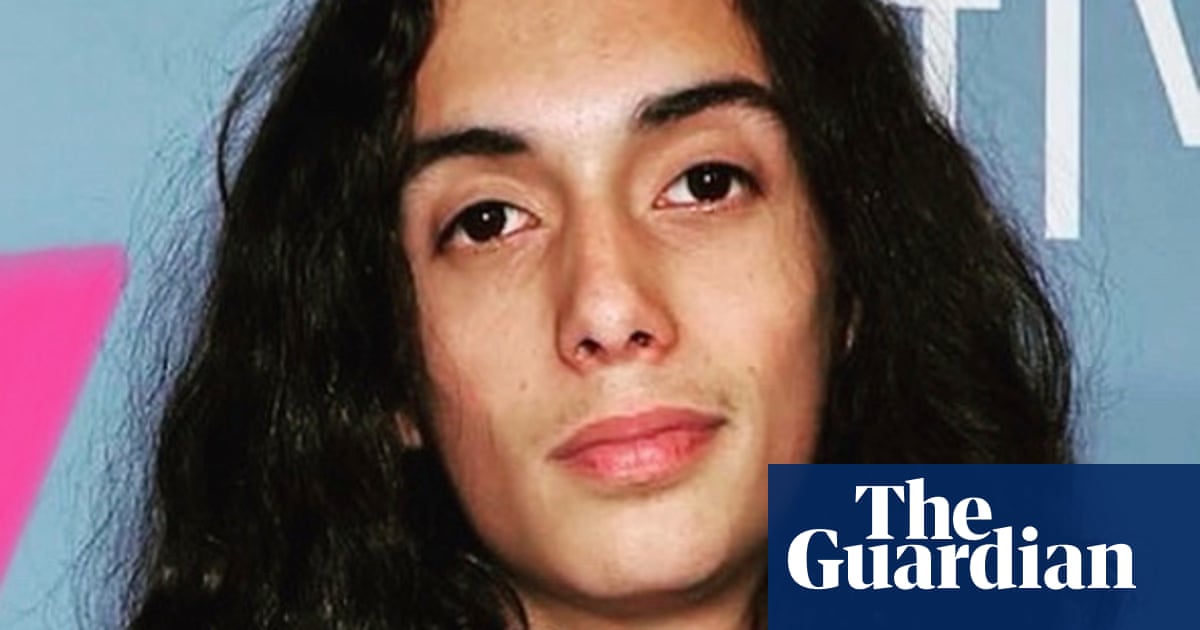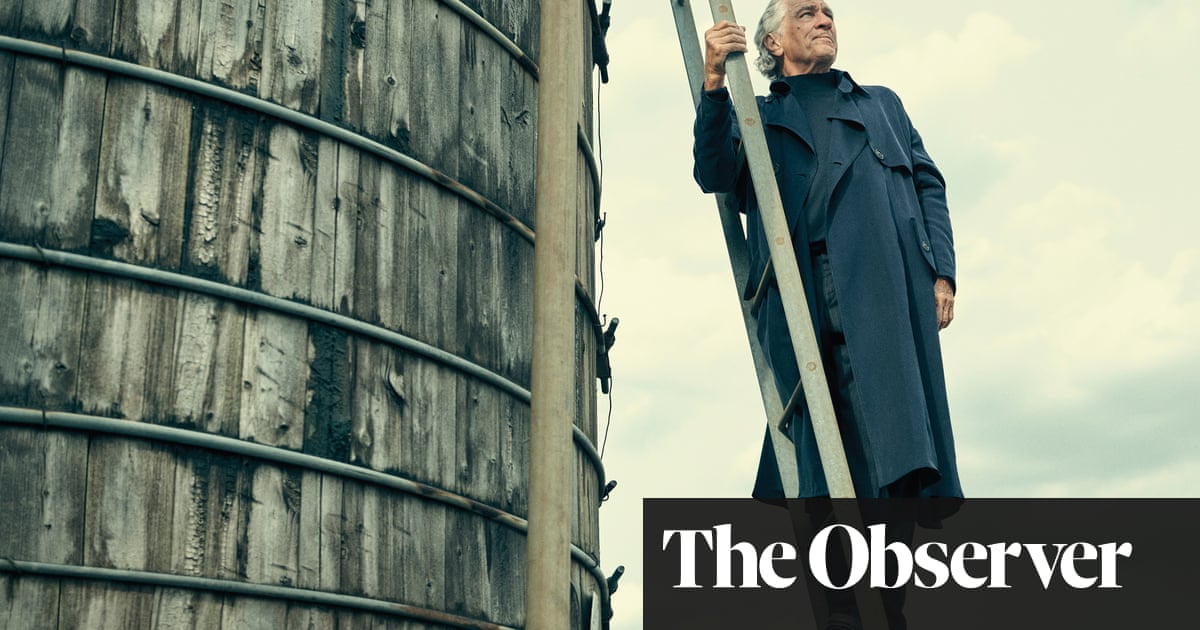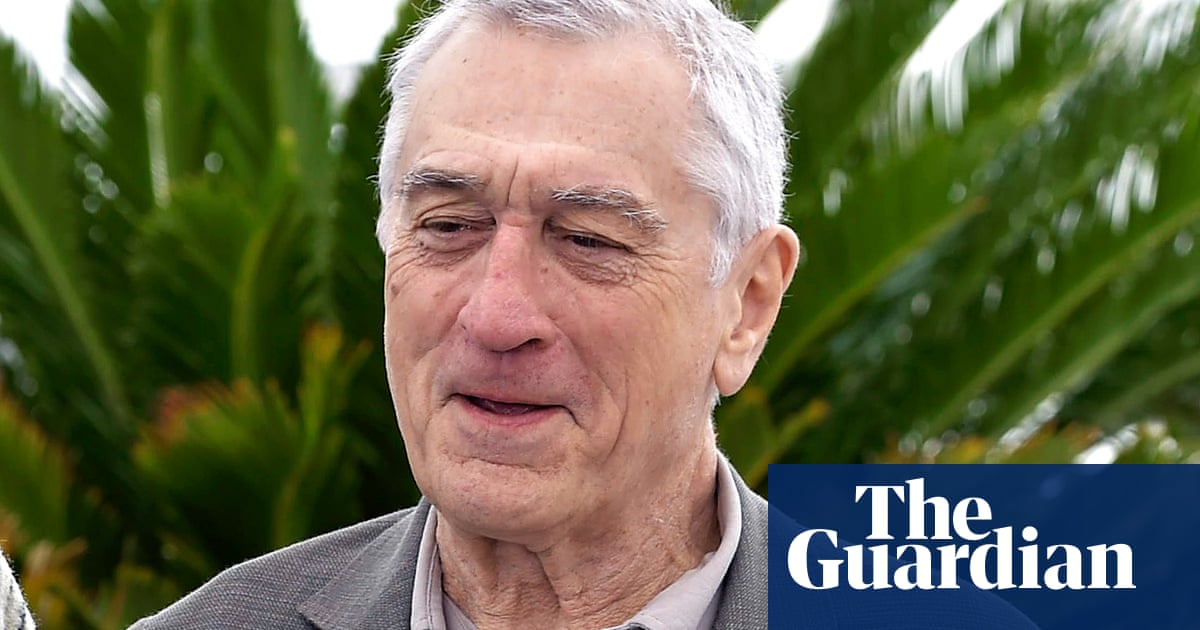
Abrief flurry of tabloid interest surged around Robert De Niro a few months ago, after the news that he had fathered his seventh child at the age of 79. I had no particular interest in the story: the jolt to me was the reminder that De Niro, still among the most vital and magnetic of working actors, was pushing 80 – a birthday he in fact celebrates next week. That’s an age at which many actors are sidelined into dully avuncular supporting roles, if they’re not retired altogether. De Niro, soon to be seen on slyly terrifying form as a lead in Martin Scorsese’s crime epic Killers of the Flower Moon, has rather more fight left in him.
To mark the occasion, Mubi has programmed a quartet of De Niro films on its platform this month. Sergio Leone’s vast, glorious, bullet-holed underworld tapestry Once Upon a Time in America and Terry Gilliam’s loopy surrealist dystopia Brazil can be streamed there now, with De Niro’s unnerving high-wire turn in Martin Scorsese’s tangy media satire The King of Comedy and his terse, tough-guy showdown with Al Pacino in Michael Mann’s Heat still to come. It’s a gilded selection that nonetheless, Scorsese’s film aside, doesn’t include the actor’s most obvious or dazzling tours de force. More than 100 films into his career, De Niro’s greatest hits run deep.
You could, of course, do a whole season simply on De Niro and Scorsese’s enduring collaboration – some high points of which, including their breakout Mean Streets and their misunderstood musical, New York, New York, aren’t available to stream in the UK. The partnership seemed to have run its course in the mid-90s until their hefty and surprisingly poignant reunion on The Irishman (Netflix) four years ago: a film coloured by the pair’s mutual awareness of ageing and patriarchal rot. It’s a work with a heavy, sighing tread – a far cry from the angry, edgy characterisation of ruined veteran Travis Bickle in Taxi Driver, or the pummelling character study of their Jake LaMotta biopic Raging Bull, in which De Niro’s daunting, all-in commitment to the boxer’s personal toxicity and physical deterioration landed him an Oscar and a reputation as his generation’s premier method man.
But I love their less beloved films together too, in particular the full-throttle villainy, verging on camp, of his Max Cady amid the grand guignol excesses of 1991’s Cape Fear. Scorsese gets both De Niro’s capacity for sleek, subtly tormented restraint – something Francis Ford Coppola also tapped into by casting him as the young Don Corleone in The Godfather Part II – and his occasional taste for big, juicy ham. Not all directors exploit the latter quality quite so deftly, though I retain a soft spot for his brash, blustery Al Capone in Brian De Palma’s The Untouchables, his ripely mugging Magwitch in Alfonso Cuarón’s very Gen-X Great Expectations, and his rather soulful Creature in Kenneth Branagh’s otherwise bombastic Mary Shelley’s Frankenstein.
De Niro’s knack for broad comedy, meanwhile, has led him into some unworthy vehicles over the years – many simply reiterating the squinting, semi-psychotic deadpan vigour he brought to Analyze This and Meet the Parents at the turn of the century. But he sends up his hardman image to sublimely dorky effect in Martin Brest’s sprightly buddy caper Midnight Run, and is a scuzzy, offhand delight in Jackie Brown, his one collaboration with Quentin Tarantino; it’s somewhat surprising that there haven’t been more.
With such form in the formidable and the frightening – even down to playing the devil in Alan Parker’s deliciously lurid gothic thriller Angel Heart – some of De Niro’s most unjustly overlooked performances are those that place him in softer, atypically ordinary mode. I adore his gentle pas de deux with a similarly stripped-back Meryl Streep in the appealingly everyday New York romance Falling in Love. There’s real grace, too, in his portrait of an illiterate blue-collar worker opposite Jane Fonda in the slightly cloying but pure-hearted Stanley & Iris.
Perhaps De Niro feels the same way, having given himself notably low-key roles in the two films he has directed so far: as an honest, put-upon parent battling the corruptive influence of the mob in the sturdy, moving coming-of-ager A Bronx Tale. It’s odd that, beyond 2006’s strangely buried (and currently unstreamable) spy drama The Good Shepherd, he hasn’t directed more. Perhaps De Niro, heading into his ninth decade, will surprise us still.
All titles are available to rent on multiple platforms unless otherwise specified.
Also new on streaming and DVD
Spider-Man: Across the Spider-Verse
(Sony)
The follow-up to 2018’s Oscar-winning animated Peter Parker adventure Into the Spider-Verse proves again that comic-book movies are more exciting when they look like, well, comic books. The fluorescent, hyper-stylised visuals here are a constantly stimulating treat. Perhaps it’s multiverse fatigue within the genre that makes the story feel less fresh this time round, and inordinately stretched at 140 minutes, but the whirling spectacle compensates.
The Three Musketeers: D’Artagnan
(Entertainment in Video)
You wouldn’t have thought another version of the old Alexandre Dumas chestnut was required, but this lavish French swashbuckler swishes and swashes with a genuine panache not found in equivalent Hollywood rehashes. With an all-star cast including Vincent Cassel and Eva Green, Martin Bourboulon’s splendidly mounted film treats its material with a fast-and-loose irreverence that never devolves into smug irony. Part two is coming later this year: bring it on.
The Deepest Breath
(Netflix)
A huge word-of-mouth hit since hitting Netflix last month, this extreme sports documentary matches the high-octane visual dazzle and tension of professional free diving to a more devastating human tragedy. The transition isn’t entirely smooth, particularly as the film conspicuously withholds information for dramatic effect, but it has blunt impact.












